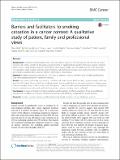Barriers and facilitators to smoking cessation in a cancer context : a qualitative study of patient, family and professional views
Abstract
Background Continued smoking after cancer adversely affects quality of life and survival, but one fifth of cancer survivors still smoke. Despite its demands, cancer presents an opportunity for positive behaviour change. Smoking often occurs in social groups, therefore interventions which target families and individuals may be more successful. This qualitative study explored patients, family members and health professionals’ views and experiences of smoking and smoking cessation after cancer, in order to inform future interventions. Methods In-depth qualitative interviews (n=67) with 29 patients, 14 family members and 24 health professionals. Data were analysed using the ‘Framework’ method. Results Few patients and family members had used National Health Service (NHS) smoking cessation services and more than half still smoked. Most recalled little ‘smoking-related’ discussion with clinicians but were receptive to talking openly. Clinicians revealed several barriers to discussion. Participants’ continued smoking was explained by the stress of diagnosis; desire to maintain personal control; and lack of connection between smoking, cancer and health. Conclusions A range of barriers to smoking cessation exist for patients and family members. These are insufficiently assessed and considered by clinicians. Interventions must be more effectively integrated into routine practice.
Citation
Wells , M , Aitchison , P , Harris , F , Ozakinci , G , Radley , A , Bauld , L , Entwistle , V , Munro , A J , Haw , S , Culbard , B & Williams , B 2017 , ' Barriers and facilitators to smoking cessation in a cancer context : a qualitative study of patient, family and professional views ' , BMC Cancer , vol. 17 , 348 . https://doi.org/10.1186/s12885-017-3344-z
Publication
BMC Cancer
Status
Peer reviewed
ISSN
1471-2407Type
Journal article
Description
This study was funded by the Chief Scientist Office, Scotland CZH/4/807.Collections
Items in the St Andrews Research Repository are protected by copyright, with all rights reserved, unless otherwise indicated.

